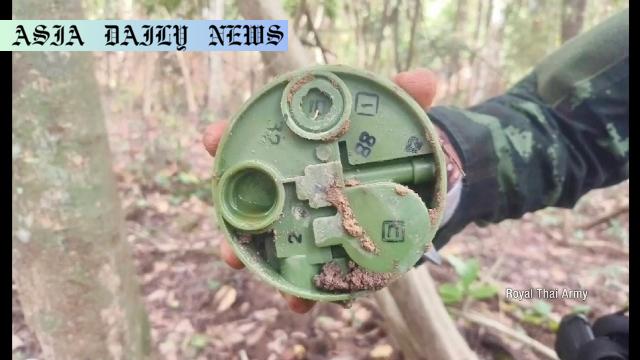Landmines: Thailand accuses Cambodia of breaching treaty after Russian-made landmines injure three Thai soldiers at disputed border.

Three Thai Soldiers Injured by Landmines: Rising Tensions Along the Border
On July 16th, three Thai soldiers were reportedly injured by landmines while patrolling a disputed area along the Thailand-Cambodia border. Among the injured, one sustained a serious leg injury. Thai officials claim that the landmines were Russian-made and recently planted by Cambodia—a direct violation of international treaties prohibiting the use of such explosive devices.
The Thai government swiftly condemned the incident, accusing their Cambodian counterparts of blatant disregard for international agreements. In a public statement, Thai government representatives alleged that these actions amounted to a breach of commitments under the Ottawa Treaty, an international accord banning the use of landmines. The treaty is seen as a critical step toward minimizing civilian and military casualties caused by such devices worldwide.
Cambodia’s Response to Allegations
The Cambodian government, however, dismissed these allegations as unfounded and lacking evidence. They categorically denied involvement in setting up the landmines and emphasized their adherence to international agreements. Amid these allegations, Cambodian officials also pointed out the importance of maintaining diplomatic channels. According to their representatives, such incidents require thorough investigation and cooperation rather than escalation of tensions.
Nevertheless, the accusation further strains the relations between these two Southeast Asian nations. Recent skirmishes in May, which led to the death of a Cambodian soldier, have already left the border region volatile. This latest event adds another layer of complexity to the ongoing tensions.
Historical Disputes Over the Border Area
The Thailand-Cambodia border disputes date back decades and largely center around territorial claims. At the heart of the issue lies a contested area near the Preah Vihear Temple, a UNESCO World Heritage Site. Both nations have asserted ownership over parts of the surrounding land, leading to repeated clashes between their militaries.
Although a ruling by the International Court of Justice (ICJ) in 1962 granted the temple itself to Cambodia, the ambiguous demarcation of the surrounding territory has continued to fuel mistrust and conflicts. This situation has occasionally turned violent, as demonstrated by the exchange of fire between Thai and Cambodian forces in May of this year.
Global Implications and Human Rights Concerns
The use of landmines and their impact on military personnel and civilian populations have drawn criticism worldwide. International organizations have frequently highlighted the devastating long-term consequences of landmines on communities, especially in regions already grappling with poverty and instability.
In this particular instance, the Thai government’s claims raise several important questions regarding the accountability and enforcement of international treaties like the Ottawa Treaty. If proven true, the allegations against Cambodia could lead to international diplomatic pressure or sanctions, further isolating the nation. On the other hand, Cambodia’s categorical denial emphasizes the importance of evidence-based decision-making and impartial investigations.
The international community will likely keep a close eye on this developing situation, as it symbolizes broader concerns about border conflicts, treaty enforcement, and the lingering dangers of landmines in conflict zones. Cooperation and mutual dialogue will be crucial to deter future incidents and ensure peace in the border region.
Commentary
The Complexity of Cross-Border Conflicts
The recent incident involving the injury of three Thai soldiers due to landmines near the Cambodia border highlights the intricate nature of cross-border conflicts. Events like these often serve as a grim reminder of the long-standing territorial disputes between nations, particularly those with historical tensions like Thailand and Cambodia. In a region where diplomatic ties are already strained, incidents involving landmines inevitably ignite political and public outrage.
The Role of International Treaties
One of the most significant aspects of this situation is the alleged breach of the Ottawa Treaty, which aims to eliminate the use of landmines globally. Landmines represent a cruel weapon that indiscriminately affects both soldiers and civilians. In this case, accusations of treaty violations underline the challenges faced by international diplomacy in enforcing agreements. Both Thailand and Cambodia must navigate this sensitive issue carefully, recognizing the importance of mutual accountability and adherence to global norms.
Paths Toward Resolution
To resolve this situation, both nations must prioritize dialogue and transparency. Independent investigations should be conducted to determine the origin of the landmines and assess the validity of the allegations. Such an approach would ensure that justice is served without escalating tensions further. It is also crucial for the international community to actively mediate and facilitate peaceful discussions between the two nations. Promoting trust-building measures could help mitigate future conflicts and pave the way for lasting peace in the region.
In conclusion, this incident serves as a stark illustration of the importance of maintaining peace along contested territories. Landmines, historical disputes, and geopolitical friction remain pressing concerns for Southeast Asia. Collaborative efforts, both at regional and global levels, will be critical to addressing these challenges and ensuring the safety and stability of affected populations.


